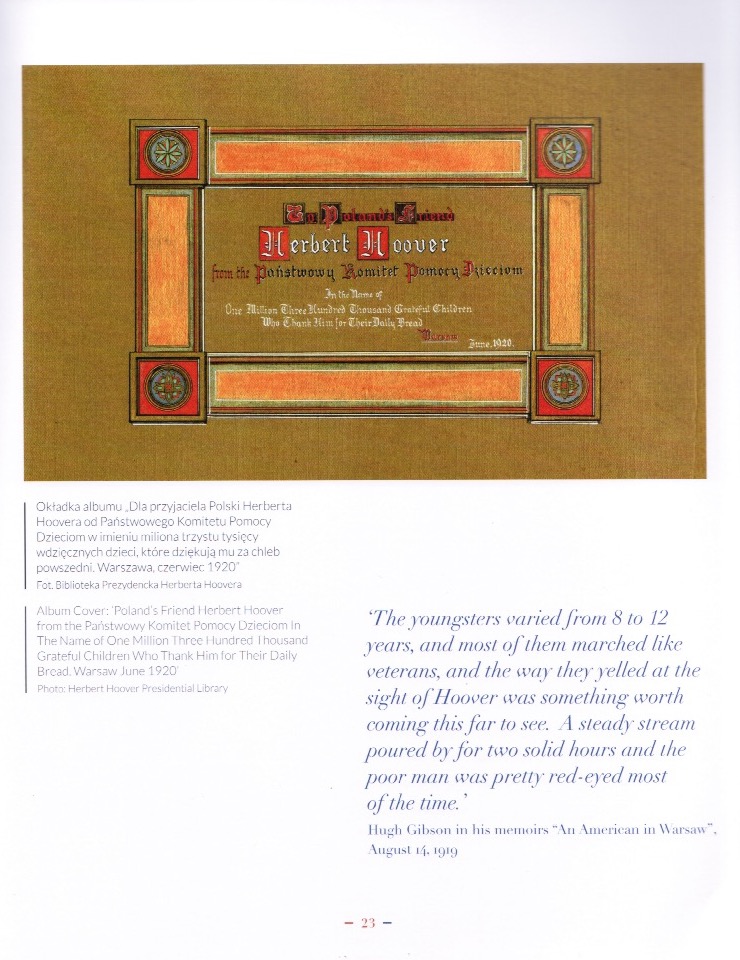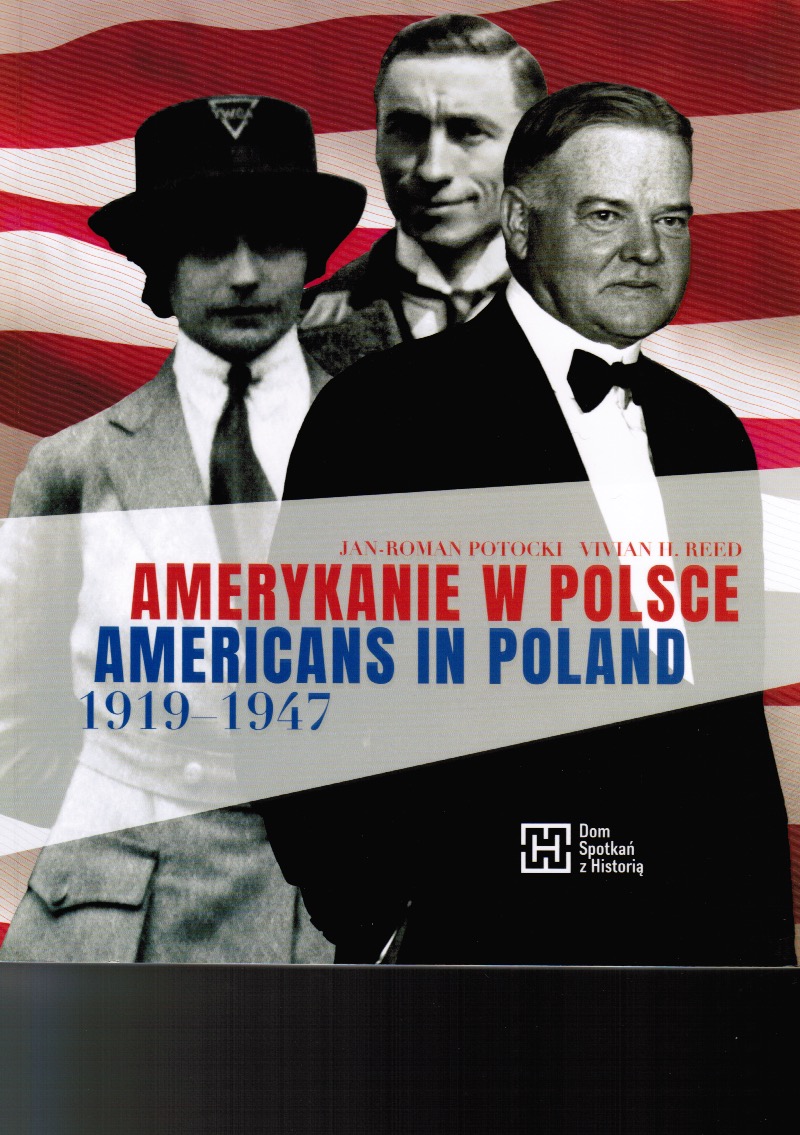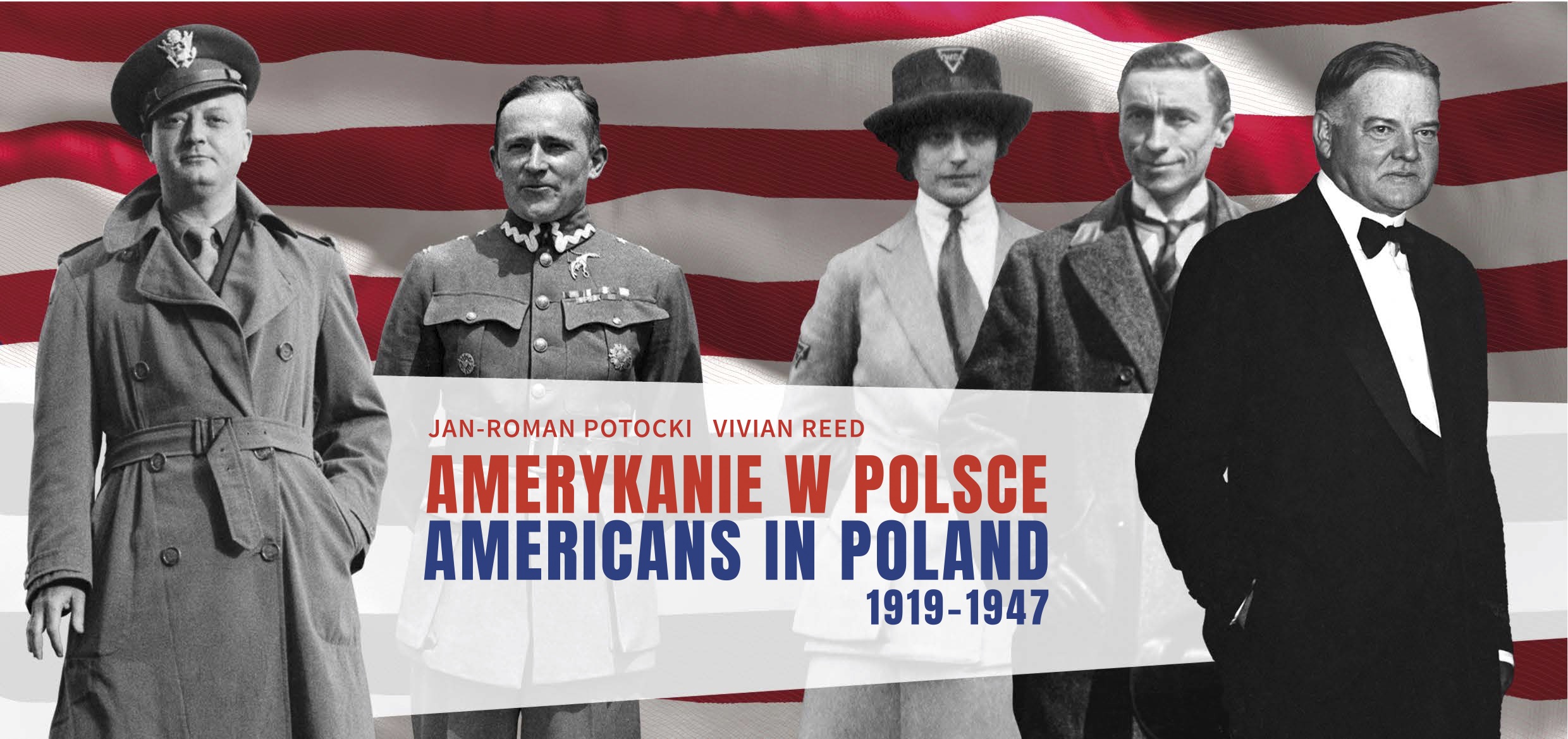Amerykanie w Polsce – Americans in Poland, 1919-1947 is a visually stunning bilingual catalogue for the exhibition which was held last summer in Warsaw at the History Meeting House (Dom Spotkań z Historią) in partnership with the US Embassy and American Center Warsaw. The catalogue can now be purchased online (follow instructions listed below) to help cover the expenses involved in preparing the second edition of this exhibition being planned in the US for 2021. The text is bilingual, English and Polish, making the book a perfect gift for Polish and Polish-American and Polish-Canadian friends and relatives, as well as for non-Polish Americans and non-Polish Canadians who would be interested in learning more about Poland’s history and Polish-American relations in the 20th century. By buying this book, you can help bring the exhibition to the United States.
The exhibition catalogue highlights a generation of Americans, none of whom had Polish ancestry, who devoted their talent, influence and energy to help Poland recover and defend its independence between 1919 and 1939. During WWII and immediately after, they fought against impossible odds, never giving up on their conviction that Poland would eventually rise up again.
Among them were three diplomats: Hugh Gibson, Anthony Drexel-Biddle, Arthur Bliss Lane; military pilots including Merian Cooper; journalists including Pulitzer Prize war reporter Larry Allen; humanitarian workers including a Nobel Peace Prize winner Maurice Pate; and Herbert Hoover before and after his US presidency.
The authors of the catalogue are Jan-Roman Potocki and Vivian H. Reed. Jan-Roman Potocki graduated from the Institute d’Études Politiques in Paris and Cambridge University. His own family history motivated him to illustrate Poland’s place in the world through stories of Americans and Poles cooperating for a common cause. His uncle, Jerzy Potocki, was the Polish Ambassador in Washington (1936-1940).
Vivian H. Reed is an American historian who together with M.B.B Biskupski, Jochen Böhler and Jan-Roman Potocki wrote and edited An American in Warsaw: Selected Writings of Hugh S. Gibson, US Minister to Poland, 1919-1924.
A superb bi-lingual catalogue (EN/PL) for Amerykanie w Polsce – Americans in Poland, 1919-1947 is now available for purchase online, 120 pages, in color , with 100+ rare archive photos, soft cover.
Unfortunately, the catalogue is not listed on Amazon, but it can be purchased through a PayPal platform from Potocki Spirits Ltd (Jan-Roman Potocki is also a successful entrepreneur in charge of his family’s spirits production. If you are buying the catalogue for a library, a club, an organization or a business, you may want to alert your management that this is a book purchase in support of an educational cause.)
Order the bilingual catalogue to help bring the Americans in Poland exhibition to the United States in 2021.
https://www.paypal.me/battleforthetruth
If you follow these instructions listed here, the company promises that the book will be mailed promptly from Poland.
I ordered several copies for delivery in Poland and in the US. It is possible to leave shipping instructions on the PayPal platform. All books were shipped and delivered within the promised time period. It was possible to enter different shipping addresses in the PayPal comments section. All of my instructions were honored. For delivery in Poland, I used the regular mail price.
- On the PayPal platform click on GBP, go down the list of currencies and choose USD currency.
- Calculate your price for delivery to US or Canada (regular mail – 3 weeks, or airmail – 1 week).
1 catalogue: US$ 20.00 Regular Mail / US$ 25.00 Airmail
2 catalogues: US$ 40.00 Regular Mail / US$ 50.00 Airmail
3 catalogues: US$ 50.00 Regular Mail / US$ 60.00 Airmail
DO NOT CLICK on the box “goods and services” on the PayPal platform. (Clicking on it will not affect the delivery, but I was informed that not clicking “goods and services” makes it a purchase in support of an educational initiative.)
- Provide address for delivery and any additional instructions.
I am certain that you will enjoy reading Americans in Poland as I did. In addition to being visually stunning, the book is also superbly written by Jan-Roman Potocki and Vivian H. Reed. It has one of the best concise descriptions of Polish-American relations in the 20th century.
As noted by Piotr Jakubowski, Director of the History Meeting House, the United States was one of the first countries to officially establish diplomatic relations with Poland after the end of World War I.
Without President Woodrow Wilson’s strong political support and President Herbert Hoover’s relief effort, Poland’s transition to independence would have been a much more difficult process.
It is a book not only about Americans in Poland but about American friends of Poland. I believe that most Americans, had they known all the facts before the 1944 Yalta conference, would have not tolerated President Franklin D. Roosevelt giving Stalin essentially a free hand in post-war East-Central Europe, even if not much could have been done by the United States to change the situation on the ground at the end of World War II. Anyone with any knowledge of history would have known that Stalin would not keep his promise to FDR of holding free and democratic elections. While the book only covers the period until 1947, some of the Americans whom it presents, including Ambassador Arthur Bliss Lane, were already working on trying to reverse the tragic consequences of Poland’s post-Yalta fate. The authors point out that the collective reporting by US journalists who were in Poland between 1945 and 1947 “yielded important evidence of Soviet methods, but also illustrated the Poles’ efforts to rebuild their country and lives at all costs.” Ambassador Bliss Lane was urging that the Voice of America (VOA), which during the war broadcast pro-Soviet propaganda, be reformed through a change of programming and hiring of non-communist Polish refugee journalists. A few years later, General Dwight D. Eisenhower, Ambassador Bliss Lane and a young Ronald Reagan contributed to the setting up of Radio Free Europe.
The “battle for the truth” continued during the Cold War on the basis of contributions made by the American friends of Poland highlighted in the book. They laid the ground for President Carter’s policy of advocating for human rights and peaceful engagement advised by Zbigniew Brzeziński. The culmination of this policy was President Reagan’s decisive support of Solidarity in the 1980s, the fall of communism and the restoration of Poland’s sovereignty. As US Ambassador to Poland Georgette Mosbacher pointed out in her introduction to the catalogue, Poland is now “one of the strongest European allies of the United States, being part of both NATO and the European Union.” I highly recommend this book to all of my American and Canadian friends.





